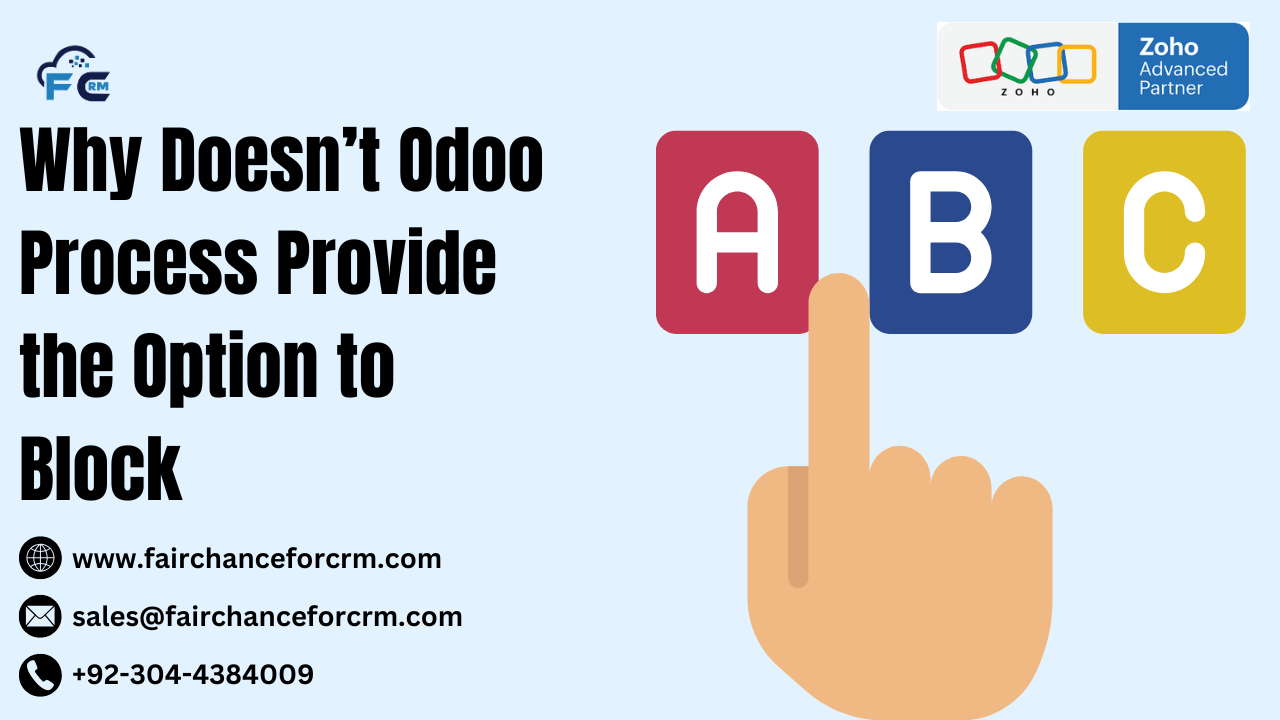Why Doesn’t Odoo Process Provide the Option to Block. Odoo is one of the most versatile and widely used open-source Enterprise Resource Planning (ERP) systems. It offers a variety of modules for managing a business’s sales, finance, inventory, manufacturing, and more. However, one common query from Odoo users revolves around the absence of an option to “block” a process, whether it’s a specific operation, user access, or data entry.
In this article, we will explore why Odoo does not inherently provide a “block” option for certain processes, what alternatives are available for controlling workflows, and how businesses can ensure their operations are safeguarded using Odoo’s features and configurations.
Also Read:
Why Doesn’t Odoo Process Provide the Option to Block
In the context of Odoo, the term “block” can refer to different things depending on the type of process or action being considered. Here are a few common scenarios where users might expect a “block” option:
- Blocking Users from Performing Specific Actions: For example, preventing a user from editing or confirming sales orders, invoicing, or modifying inventory records.
- Blocking Specific Data or Transactions: This might involve locking a particular record (like a sales order or a purchase invoice) to prevent further modifications once it has reached a certain stage in a process.
- Blocking Entire Processes: In some cases, users might want to stop certain workflows or operations temporarily (e.g., halting the manufacturing process, preventing the creation of new purchase orders, etc.).
- Preventing Data Entry: This would mean preventing new entries in specific modules until certain conditions are met (like preventing the creation of new records until an approval is granted).
Why Doesn’t Odoo Process Provide the Option to Block
Odoo is designed to be a flexible and extensible platform, accommodating a wide range of business processes and workflows. However, there are a few reasons why the system doesn’t provide a built-in option to “block” or “lock” entire processes universally:
1. Flexibility vs. Restrictiveness
- Odoo is built with flexibility in mind, allowing businesses to configure their workflows according to their unique needs. A universal “block” feature could make the system overly restrictive and hinder users from customizing their processes.
- Instead of a one-size-fits-all “block” function, Odoo provides multiple ways to configure user permissions, approvals, and workflow rules. These options give businesses the freedom to define when and how actions should be restricted, rather than implementing a blanket “block.”
2. Role-Based Access Control (RBAC)
- Odoo’s security model is primarily based on Role-Based Access Control (RBAC), where access rights are granted or restricted based on the user’s role. Blocking a process often depends on defining the appropriate access rights for each user or group of users, rather than using a single “block” function.
- For example, restricting access to certain documents or actions can be done by configuring user permissions and assigning them to specific roles. This ensures that only authorized personnel can perform critical actions like confirming sales orders or processing payments.
3. Workflow Customization
- Why Doesn’t Odoo Process Provide the Option to Block? Odoo supports extensive customization through workflows and automations. For instance, businesses can set up specific approval processes or conditional rules that govern when a particular action can be taken. This can sometimes be more effective than a simple “block” option.
- By customizing workflows, businesses can ensure that certain actions (like confirming orders, processing shipments, or generating invoices) are only possible when certain criteria are met (e.g., an order is fully paid, inventory is available, or approval has been granted).
4. Odoo’s Modular Structure
- Odoo’s modular nature allows each department (Sales, Inventory, HR, etc.) to manage its own processes independently. As a result, the need to “block” processes across modules might conflict with how individual modules are designed to operate.
- In Odoo, different modules are interconnected, and each one may have its own set of approval rules and restrictions. A global “block” feature could conflict with the inherent design of these modules, making the ERP system cumbersome to manage.
Alternatives for Why Doesn’t Odoo Process Provide the Option to Block
While Odoo doesn’t provide a generic “block” option, it does offer several features and configurations to control processes and restrict actions when needed. These alternatives allow businesses to maintain control over their workflows without compromising flexibility.
1. User Permissions and Access Rights
- User Groups: In Odoo, each user can be assigned to a specific group that defines their access rights. These rights can be adjusted based on roles like sales manager, accountant, warehouse operator, etc.
- Record Rules: Odoo allows businesses to set record-level rules, ensuring that certain records are visible or editable only by users with specific permissions.
- Blocking Transactions by Role: By configuring user roles, businesses can prevent certain actions (such as confirming sales orders or processing invoices) for specific users.
How to Set Up:
- Go to Settings > Users & Companies > Users.
- Select the user you want to modify and assign them the appropriate roles or permissions.
2. Approval Workflow
- For some processes, such as sales orders, purchase orders, or invoices, Odoo offers an Approval Workflow. This ensures that certain actions cannot be completed until they are approved by an authorized person.
- For example, you can set up a rule to require managerial approval before confirming a sales order or invoice.
How to Set Up:
- Navigate to Settings > Technical > Automation > Approvals.
- Define the required approval steps for each process.
3. Automated Actions
- Odoo also allows businesses to define automated actions that can prevent or trigger specific actions based on predefined conditions. For example, you can set up an automated action that sends a warning or prevents the confirmation of a sales order if certain conditions (like insufficient stock or unpaid invoices) are met.
How to Set Up:
- Go to Settings > Technical > Automation > Automated Actions.
- Create a new action that triggers based on specific conditions (e.g., stock availability, invoice status).
4. Data Locking (Lock Dates)
- Odoo provides an option to “lock” certain data entry processes by defining lock dates. For example, if you want to prevent users from modifying accounting entries or transactions for a closed period, you can set a lock date in the system. This effectively “blocks” any changes after that date.
How to Set Up:
- Go to Accounting > Configuration > Periods > Lock Dates.
- Define the period you want to lock for modifications.
5. Custom Development
- For highly specific use cases, businesses can develop custom modules or modifications to implement blocking rules. Odoo’s open-source nature allows developers to write custom logic that blocks certain actions or processes based on business requirements.
Conclusion
Why Doesn’t Odoo Process Provide the Option to Block, it offers a wealth of configurable features that allow businesses to control workflows and restrict actions based on permissions, conditions, and approval processes. By understanding how to leverage Odoo’s user permissions, workflows, automated actions, and lock dates, businesses can effectively manage their operations while retaining the flexibility that Odoo is known for.
Ultimately, rather than providing a blanket “block” option, Odoo allows businesses to tailor restrictions and safeguards to meet their specific needs, offering a highly customizable solution that can be adapted to various business models and requirements.
For more information about Why Doesn’t Odoo Process Provide the Option to Block, visit this link.
If you want to Free Trail Zoho, click on this link.





Recent Comments